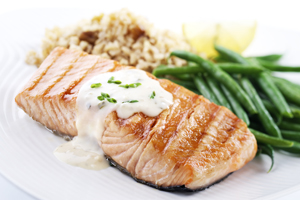 Fish and shellfish are an excellent source of vitamins and minerals; high in protein, low in fat and particularly high in omega-3 fatty acids. Steamed, baked or grilled fish are healthier choices than fried fish. When you fry fish, you lose a lot of the health benefits. Eating a wide variety of fish can help to maintain your health, and help to sustain a healthy population of fish in our oceans.
Fish and shellfish are an excellent source of vitamins and minerals; high in protein, low in fat and particularly high in omega-3 fatty acids. Steamed, baked or grilled fish are healthier choices than fried fish. When you fry fish, you lose a lot of the health benefits. Eating a wide variety of fish can help to maintain your health, and help to sustain a healthy population of fish in our oceans.
Oily fish: Oily fish, such as fresh tuna, salmon, pilchards, sardines, mackerel, carp and anchovies contain omega-3 fatty acids. Shellfish, such as oysters, squid, mussels and crab also contain omega-3, as do some white fish (though not as much as oily fish). Omega-3 may help prevent heart disease. Omega-3 fatty acids are a type of unsaturated fatty acid believed to reduce inflammation throughout the body which can damage blood vessels and lead to heart disease. A healthy diet should include at least two portions of fish a week. It is healthy to eat up to four portions of oily fish a week (unless you are, or may become pregnant, then two portions a week is recommended). White fish, such as Atlantic cod, haddock, plaice, pollack, coley and dover sole can be safely eaten as many times a week as you like. The heart benefits of eating fish depend on how it is prepared. Deep fried fish is low in omega-3. Fish can be enjoyed steamed, grilled, lightly pan-fried, baked, barbequed, added to stir-fries, casseroles and soups whilst maintaining the benefits of omega-3.
Does fish make you smarter? Some scientists believe eating food rich in omega-3 can boost blood flow to the brain, improving the ability to perform during mental tasks. It is believed omega-3 can improve reaction times, and reduce levels of tiredness after performing tough tasks.
Many vitamins, such as A, E, D and K are fat-soluble, and require fat to break them down. This is one of the reasons fish oil plays such an important role in brain health and in the health of other organs, such as the heart. Without enough healthy fat in one’s diet, not enough vitamin A, E, D and K get absorbed into the system.
Children and Fish: Oily fish is a good source of vitamin D for children. It helps ensure a good supply of calcium in the blood and therefore healthy bones. Fish is a good source of protein, vitamins and minerals and is low in saturated fat. Oily fish, such as mackerel, salmon and sardines contain omega 3 fatty acids. Children should eat at least two portions of fish a week. Some scientists believe eating oily fish plays a part in reducing the likelihood of children developing asthma. Other health benefits linked to eating fish are healthy brain tissue, healthy eyes, reduction of the risk of cancer, lower incidence of depression, and relieved symptoms of inflammatory disease.
Oily fish: The following oily fish may help to prevent heart disease and reduce inflammation throughout the body, help absorb vitamins and improve blood flow to the brain, improving concentration and reaction times. A gauge of the amount of omega-3 fatty acids (EPA and DHA) from the higher amount of approx. 1.5g per 3oz serving to the lower amount of approx. 200mg per 3oz is displayed under the fish name.
 |
 |
 |
 |
| Wild Salmon | Sardines | Mackerel | Herring |
| High | High | High | High |
 |
 |
 |
 |
| Mussels | Crab | Tuna | Clams |
| Moderate | Moderate | Moderate | Moderate |
 |
 |
 |
 |
| Anchovy | White Fish | Oysters | Scallops |
| High | High | Moderate | Moderate |
Omega-3’s are considered essential fatty acids because the body needs them but cannot make them on its own. We have to make sure we get enough in our diets.
